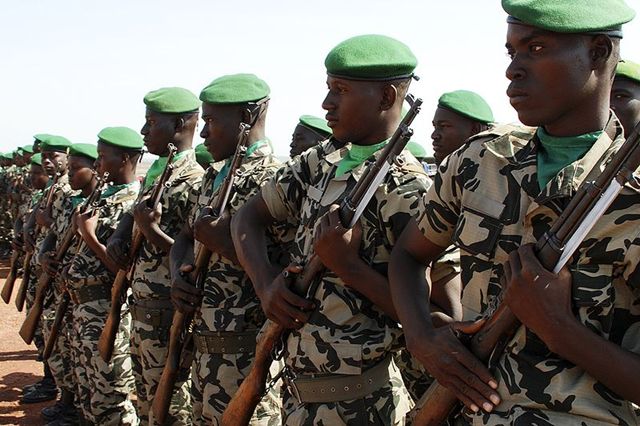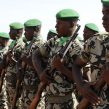
Hot Issue — Revolutionary Roadshow: Libyan Arms and Fighters Bring Instability to North and West Africa: Part Two
By:

Executive Summary:
A year after the eruption of Libya’s spontaneous revolution, there are few signs of progress towards establishing internal security or a democratic government. Real power lies in the hands of well-armed militias with little inclination to disarm or demobilize and the ruling Transitional National Council (TNC) has been reduced to holding its meetings in secret to avoid bottle-throwing, grenade-hurling demonstrators. Amidst this turmoil come increasingly louder demands for a Shari’a regime as the old regime’s looted armories and former soldiers fuel new insurrections in the Sahel/Sahara region. Even as neighboring Mali descends into a new round of rebellion that threatens to become an all-out civil war, Niger and Algeria are struggling to find ways to break the wave of violence at their borders.
The alarming developments on the Libyan periphery inspired a special two-day meeting of foreign ministers and intelligence chiefs from Mali, Algeria Mauritania and Niger in Nouakchott in late January. These officials also invited their counterparts from Nigeria and Burkina Faso to discuss the rising “terrorist threat” in the Sahel/Sahara region and the possibility of ties between AQIM and Nigeria’s Boko Haram militants (AFP, January 23; PANA, January 24; Nouvel Horizon [Bamako], January 24).
*Part One: The Libyan Pandemonium can be found here.
Part Two: Libyan Arms Enable New Tactics and Strategies
Some observers have noted a change in Tuareg tactics in the current rebellion in a switch from their usual adherence to guerrilla methods to attacks in strength and attempts to seize and hold settlements in northern Mali. The effort to carve out a new Azawad nation may well be fuelled by the rebels’ possession of superior weaponry obtained during the Libyan collapse (Le Republicain [Bamako], January 30). The assaults on small towns in the north may be a means of testing the strength of the Malian army before the Tuareg rebels mount attacks on larger centers like Gao and Timbuktu.
However, not all Mali’s Tuareg fighters have joined the insurrection. Malian military operations in the north are currently under the command of Colonel al-Hajj Gamou, a loyal Tuareg officer who has served in the Malian army since 1992. A loyalist unit of Tuareg in Kidal Region led by Muhammad ag Bachir has also backed government security forces by arresting a number of individuals suspected of supporting the MNLA, including Colonel Hassan ag Fagaga, a veteran Tuareg rebel leader who had threatened to restart the Tuareg insurgency if Bamako did not fulfill the conditions laid out in the 2008 Algiers Accord (Jeune Afrique, January 24; El Khabar [Algiers], July 15, 2010; see also Terrorism Monitor, September 2, 2010). Other former Tuareg members of the Libyan military resettled at Menaka were reported to have joined in efforts to repulse the MNLA attack of January 17 (Jeune Afrique, January 24).
The rekindling of the Tuareg insurrection in Mali appears to be provoking a resurrection of the notorious Ganda Koy and Ganda Iso militias, loosely organized self-defense units formed from the black African communities (primarily Songhai and Fulani) in the largely Tuareg and Arab northern provinces of Mali, a development that threatens to turn the northern conflict into a more general civil war. The Bérabiche Arabs of northern Mali are also reforming their militias, which have cooperated with government offensives against Tuareg rebels in the past (Le Combat [Bamako], January 31).
The Response from Algiers
Algeria responded to the Tuareg attacks in Mali by raising its security alert to the highest level. Algiers has long been unhappy with Mali’s failure to secure its northern regions, which now provide bases for the Saharan offshoot of the Algerian-based al-Qaeda in the Islamic Maghreb (Ilaf.com, January 20; al-Quds al-Arabi, January 20). Le Pouvoir, the Algerian political/military/business elite that controls most aspects of Algerian life, fears instability above all else and has tried to shut down any effort within Algeria to emulate the revolutionary unrest in Tunisia, Libya and Egypt. A series of so-far uncoordinated riots in Algerian cities has no doubt alarmed Algeria’s elite. Algiers fears that this wave of unrest is intended to pave the way for foreign intervention in North Africa, but many Algerians worry that the government’s inability to extinguish AQIM’s low-level insurgency is a means of justifying Le Pouvoir’s tight grip on Algerian politics and maintaining high levels of spending in the military and security services.
Unable to rein in AQIM, Algiers has chosen to fight AQIM’s shadow, sentencing the commander of AQIM”s Sahara/Sahel branch, Abd al-Hamid Abu Zeid (a.k.a. Muhammad Ghidr) to life in prison, a sentence applied in absentia. Abu Zeid is the leader of the Tariq Ibn Ziyad unit of AQIM, which uses kidnappings and murder as their main tactics. Another Algerian court is still hearing the in absentia case against AQIM commander Mokhtar Belmokhtar for the deaths of two Algerian soldiers (NOW Lebanon, January 22).
Algeria, which played an important part in resolving previous Tuareg insurrections in Mali, has indicated that it views AQIM and the MNLA rebellion as “two different issues” and has undertaken mediation efforts between the rebels and Bamako. Prior to the outbreak of the latest Tuareg rebellion, Algeria attempted to aid Malian counterterrorism efforts by sending a small group of military trainers to provide instruction in anti-terrorist techniques (L’Aube [Bamako], December 22). However, the recent withdrawal of Algerian military trainers from Mali and a freeze on further shipments of military equipment was intended by Algiers to force a political settlement to the current conflict (El Khabar [Algiers], January 28). An MNLA spokesman said that the Tuareg attack on Tessalit came only after Algerian military personnel were withdrawn as the attackers did not wish to involve Algeria in the fighting (Reuters, January 27). Algeria is also aware of other less obvious threats to Mali’s security and recently shipped 3,100 metric tonnes of food to address Mali’s increasing difficulty in feeding its population (L’Independant [Bamako], January 31).
Algeria is facing parliamentary elections in May in which Algerian Islamists are expected to do well as an alternative to the existing power structure under which unemployment and housing shortages have flourished (Reuters, January 31).
The Response from Bamako
With presidential elections on their way in April, President Amadou Toumani Touré appears to be ready to apply the military option to the Tuareg problem, particularly since he must now deal with the Tuareg insurgents without recourse to the mediation of the late Colonel Qaddafi. Bamako also appears prepared to take extraordinary measures to save the situation in the north. Mohamed Ould Awainatt, a member of northern Mali’s Arab community and one of the main suspects on trial in the notorious 2009 Boeing 727 shipment of cocaine to northern Mali that ended with the traffickers torching the aircraft, was suddenly and quietly released from detention on January 19. His release in a case that severely embarrassed Mali was reportedly obtained as the result of a demand from a group of young Arabs the government of Mali was trying to enlist in the fight against their Tuareg neighbors (22 Septembre [Bamako], January 23; AFP, January 23).
In Timbuktu there are constant rumors of an imminent attack on the city and widespread fear of a Tuareg attack on the city’s Arab community (L’Independent [Bamako], January 24; Le Pretoire [Bamako], January 30). In the capital of Bamako there is talk of Western conspiracies, French “hatred” of independent Mali, malicious plots devised by Mauritanian generals and the alleged operations of foreign spies working hand-in-hand with al-Qaeda to divide Mali. Some Malian media sources have suggested that France and possibly other Western nations had persuaded many Tuareg fighters to abandon Qaddafi’s forces during the Libyan uprising with promises of support for an independent Azawad (Nouvelle Liberation [Bamako], January 24; L’Aube [Bamako], December 22, 2011). Local media is almost unanimous in its calls for a hardline approach to the latest Tuareg rebellion, with one columnist even advocating the use of nuclear weapons in Mali’s barren north (Le Pretoire [Bamako], January 30; L’Aube [Bamako], January 30; Le Potentiel [Bamako], January 31).
Libyan Arms Flow in All Directions
The availability of looted Libyan arms may allow new armed groups to form in West Africa with greater ease than usual. One such group may be the Jamaat Tawhid wa’l-Jihad fi Garbi Afriqqiya (Movement for Oneness and Jihad in West Africa – MOJWA), led by Hamada Ould Mohamed Kheirou (a.k.a. Abu Qumqum) and dedicated to the spread of Shari’a throughout West Africa. According to a video released by the movement, MOJWA broke away from AQIM due to the domination of the movement’s leadership by Arab militants from Mauritania and Mali. MOJWA appears to be a black African Muslim reaction to the traditional domination of all al-Qaeda branches by Arab Muslims, and their video has a specifically African character by using Hausa and English as well as Arabic to praise a number of important West African Muslim empire builders of the 19th century (AFP, December 22). In a video released in early January, Kheirou said his movement had declared “war on France, which is hostile to the interests of Islam” (AFP/NOW Lebanon, January 3). Though the group has only carried out one kidnapping operation so far, the spread of Salafi-Jihadist militancy into relatively unaffected West African Muslim communities would be an alarming development. Just by kidnapping European aid workers from a Polisario camp of West Saharan refugees in Algeria, MOJWA has helped inflame the difficult security situation in the region. Polisario operatives are now searching for Kheirou and his three European hostages.
In light of the tense political situation in Egypt, news that Egyptian border guards had prevented smugglers from bringing a shipment of machine guns, sniper rifles and ammunition into Egypt through the Libyan Desert was an disturbing development in Egypt’s unfinished revolution (MENA [Cairo], January 24; January 18).
Conclusion
The West’s poorly considered support of a spontaneous Libyan rebellion lacking common aims, ideology or even basic organization has secured the present reality. Clearly, the restoration of security in Libya is an essential first step in stabilizing the region. Unfortunately, the ability of Libya’s Transitional National Council to either project force or promote conciliation seems to be diminishing rather than increasing. If Libya is unable to make progress on disarmament and unification issues, the stage may be set for the emergence of a strongman ready to enforce his will on Libya, perhaps in the form of an ambitious young colonel with fresh ideas about remaking the Libyan state…but then we’ve already been down that road. Nonetheless, both the West and Africa must now confront the security fallout from the rash decisions made a year ago.




